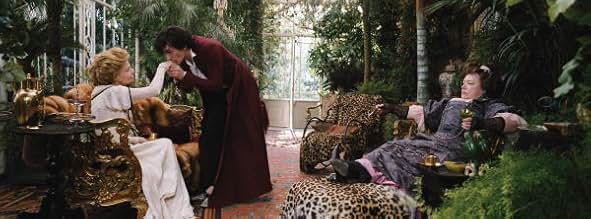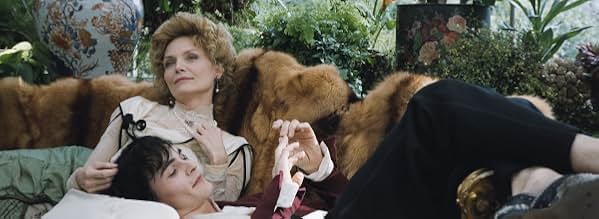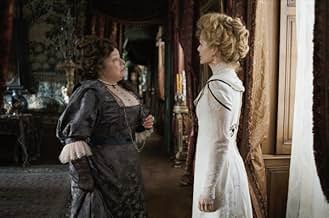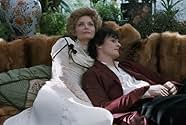Il figlio di una cortigiana si ritira in un mondo di fantasia dopo essere stato costretto a porre fine alla sua relazione con la donna più anziana che lo ha educato alle vie dell'amore.Il figlio di una cortigiana si ritira in un mondo di fantasia dopo essere stato costretto a porre fine alla sua relazione con la donna più anziana che lo ha educato alle vie dell'amore.Il figlio di una cortigiana si ritira in un mondo di fantasia dopo essere stato costretto a porre fine alla sua relazione con la donna più anziana che lo ha educato alle vie dell'amore.
- Regia
- Sceneggiatura
- Star
- Premi
- 3 vittorie e 2 candidature totali
Recensioni in evidenza
Colette's two novels about Chéri (Friend) the son of wealthy courtesan Madame Peloux (Kathy Bates), are not just about an indolent but beautiful rich slacker; they also follow the good fortune of Lea de Lonval (Pfeiffer), an unusually beautiful and profitable courtesan who has shrewdly prepared herself for financial comfort but forget the cardinal rule of prostitutes: Don't fall in love.
After six years of lover's paradise, Chéri and Lea part as the takes an arranged bride. And that's all there is, folks, as the film moves from a robust ramble about the various courtesans to a dreary hour of Twilight-like longing between this old-fashioned Harold and Maude. Director Steven Frears, who has had a fair share of intriguing films and characters, just lets the camera make love to Pfeiffer and Friend without fleshing out the characters to let is know what is so lovable to be longing for so long. Writer Christopher Hampton with Dangerous Liaisons and Atonement on his resume can't seem to muster a memorable line or develop his characters from flat clichés into round characters.
I do concede that Kathy Bates delivering this line saved the film for the moment: "Don't you find that when the skin is a little less firm, it holds perfume so much better?" Said to Michelle Pfeiffer, these lines give Bates bite of the year honors and a brief respite from spare, meaningless dialogue.
The story is simple: courtesans in Paris must eventually retire form their lives of becoming wealthy through pleasing men of the higher class, and either they live out their lives in the luxuries of fluff or they must confront their aging and feel pangs of remorse as they end their lives alone, without a man to bolster them. Lea de Lonval (Michelle Pfeiffer) has been longtime 'friends' with Madame Peloux (Kathy Bates), even to the point of nurturing Madame's son Chéri (Rupert Friend) as he approaches manhood. Madame asks Lea to 'polish' Chéri for other women and after what might have been a brief fling in Normandy, the young Chéri and the aging Lea fall into a six year relationship. But as Madame realizes she needs grandchildren, she eventually finds a proper girl Edmee (Felicity Jones) for Chéri to marry. The remainder of the story is how these two age-disparate characters adapt to the 'social rules' of La Belle Epoque, suggesting that even under extraordinary circumstances the power of love is an issue that must be confronted.
Despite the performances by Pfeiffer and Friend (and even the miscast Bates) the story feels somehow sterile. Perhaps it is the out of place use of a male narrator who gives the film an unnecessary feeling of being a documentary, or the somewhat overused musical score of Alexandre Desplat, or the emphasis on costumes that hardly add to the beauty of Pfeiffer as Lea that keep the production grounded. It is a pleasant enough film, but hardly a memorable one. Grady Harp
The plot is almost absent, being the story more based on emotions, moods, sensations, rather than facts, and the movie in the end manages to capture the viewer, thanks to its capability to render the emotional side through glances and through effective and intense framing of both characters and situations: the last one is incisive, almost paralyzing.
Ironic and funny moments are not absent, mainly when Cathy Bates, playing the odd, high spirited mother, enters the scene, but the overall tone is a melancholic one, above all for the female public, we cannot but sympathize with Lea's inner strength, and at the same time feel moved by her deep suffering. From an aesthetic point of view, the movie is to be visually appreciated for its pleasant settings, its refined costumes and in general for a deep care for precious details.
"Chéri" is a strong film, just like Stephen Frears' previous effort. It is colourful, vibrant, emotional and captivating. The characters are well sculpted, especially Chéri and Lea. They are both captivating, making us care for them, longing to see them happy. Apart from being a love story, it also handles the issue of aging the fear of it in a sensitive and emotional manner. Michelle Pfeiffer's acting is excellent, her wide range of emotions show naturally throughout the film. I also applaud her for being unconventional in Hollywood, as she lets her age show in some films to mirror the theme of aging. In addition, the film's tone changes from light to serious, which also mirrors the issue of aging. I enjoyed watching "Chéri". It is a visual delight and a captivating love story.
What the director forgot in recreating so beautifully, so painfully all the paraphernalia necessary to reproduce that magnificent time in history was... the ideal of feminine beauty at the time.
We glaringly see it in the same old pictures (authentic) shown at the start of the movie, pictures of the great beauties then, like Lillie Langtry, Lia de Putti, la Bella Otero, etc. and it's obvious that those beauties where more on the side of Marilyn Monroe than Michelle Pfeiffer, who looks like a window display mannequin with no curves in the right places and no minimal waistline (Hourglass figure painfully obtained thanks to an oppressing corset, but there it was).
To give us total recall of that time our protagonist should have been somebody a bit fatter than Ms. Pfeiffer, since we readily forget all the changes the feminine figure has suffered just in the last 100 years; what was considered fashionable or desirable then was quite different from now, and a thin woman was totally undesirable.
The film is nice, in a very superficial way, since its main flaw is irreparable, because speaking English in this superbly French story, we get a jarring note, and it's this: All the "decadent" morality, social behavior, points of view about richly kept elegant cocottes by the upper class French men is something totally unknown to puritan Victorian English society. This utterly French "Menage a Trois" is totally lost in this English version of Paris life at the turn of the century.
The house where she lives, the street, the interior locations, the dresses, all that is perfectly fine (more than fine, exquisite), but THE ESENCE of Colette masterpiece is not there. Due to the strong visual appeal in interiors, color schemes, Art Nuveau architecture and Belle Epoque fashions, this is mainly eye candy for dress designers and interior decorators.
Lo sapevi?
- QuizWhen the project was in development during the 1990s, Jessica Lange planned to star as Léa de Lonval.
- BlooperIn the closing credits, 'thanks' are given to France's national railway, the Societe National Chemin de Fer, known as the "SNCF". However the credits have the letters out of sequence, calling it the "SCNF".
- Citazioni
Lea de Lonval: You came back here and you found an old woman. Yes, you found an old woman. Don't cry. Why are you crying? I'm so grateful to you. Were you really in love with me? Did you really think I was such a good person? If I had been a truly good person, I'd have made a man of you instead of thinking of nothing but your pleasure and my happiness. I wouldn't have kept you all to myself. Look at me. You're right. The qualities you lack, I expect it is my fault. But 30 years of easy living does make you very vulnerable. So no, I never did talk to you about the future. Forgive me. I loved you as if we were going to die the same day. I carried you in my heart for such a long time. I forgot you were going to have to carry your own burdens. A young wife. Perhaps even a child. And so you're going to suffer. You're going to miss me. And you're going to have to try to find enough wisdom and tolerance not to cause suffering to others. The thing is, now you've had a taste of youth. It's never satisfying, but you'll always want to go back for more. You must go. I love you. But it's too late. So get dressed. And go away now.
- Versioni alternativeThere are five different versions. Runtimes are: "1h 40m(100 min), 1h 26m(86 min) (United States), 1h 32m(92 min) (United States), 1h 32m(92 min) (Argentina), 1h 40m(100 min) (Berlin International) (Germany)".
I più visti
- How long is Chéri?Powered by Alexa
Dettagli
Botteghino
- Budget
- 23.000.000 USD (previsto)
- Lordo Stati Uniti e Canada
- 2.715.657 USD
- Fine settimana di apertura Stati Uniti e Canada
- 405.701 USD
- 28 giu 2009
- Lordo in tutto il mondo
- 9.368.242 USD
- Tempo di esecuzione1 ora 40 minuti
- Colore
- Mix di suoni
- Proporzioni
- 2.35 : 1
Contribuisci a questa pagina


































